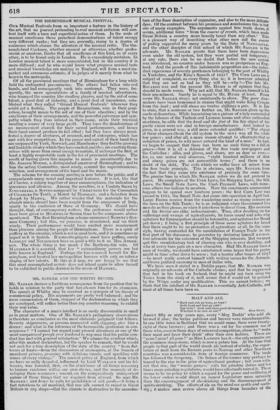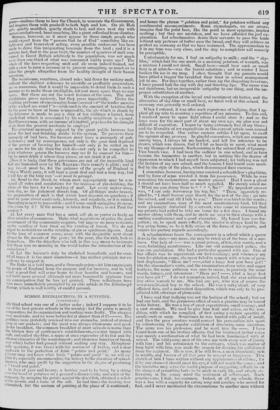MALT AND ALE.
" Back and side go bare, go bare ! Both head and feet go cold ! But belly ! God send thee good ale enough, Whether it be new or old !" OLD SONO.
ABOUT fifty or sixty years ago, every "Meg Dodds" who sold ale brewed it also ; the terms publican and brewer were interchangeable. In one little town in Scotland that we could name, there were twenty- eight of these brewers ; and there was a vat for the common use of those who, even in those days of universal competition, chose to " make their maut and brew their drink" after their own fashion, These are
"none I none' all crone '" as Miss LANDON has it—the only remains are
a • n • t, •
the common steep-stone, which is now a potato bin. At the time that
people in that part of the world drank ale instead of whisky, the expor- tation of malt from the Eastern ports to Norway and other Northern countries was a considerable item of foreign commerce. The trade has followed the twopenny. The failure of the former may perhaps be traced to the rise in the price of agricultural produce ; but even with- out that rise, the "weave gauger," with his grinding duties and ten times more grinding regulations, would have effectuallyruined it. There seems to be no policy to which a regard for the peace and wellbeing of the lower orders would direct an honest Legislature more naturally than the encouragement of ale-drinking and the discouragement of spirits-drinking. The effects of ale on the mind are gentle and sooth- ing ; it makes men averse above all things from breaches of the peace--inclines them to love the Church, to venerate the Government, and inspires them with goodwill to both high and low. On ale Hob vets quietly muddled, quietly steals to bed, and rises next day with nerves unshattered, head unaching, like a giant refreshed from slumber. Strange, however, as it must appear giant those simple people who would expect from the " powers that be of God" something like en- lightened and benevolent acting, every possible endeavour has been made to drive this invigorating beverage from the land ; and it is a curious fact, that in the year 1828, the number of quarters of malt con- sumed in Great Britain relatively to the population, was not much more than one-third of what was consumed eighty years ago ! The whole of the laws respecting malt and ale seem indeed framed, not with a view to raise a revenue or to prevent smuggling, so much as to drive the people altogether from the healthy draught of their Saxon ancestors.
The wearisome, vexatious, absurd rule; laid clown for making malt, without the slightest reference to scientific or profitable preparation, are so numerous, that it would be impossible to detail them in such a manner as to make them intelligible, without more space than we can spare. But these are not the worst features of the case. The malt regulations press uselessly, but they press impartially. Under the insulting, pretence of encouraging home-brewed—(" the tender mercies of the wicked are cruel !")—while such is the amount of taxation that for the poor to brew at home is impossible, the ale which is drunk by the labourer is made to pay a duty of ten shillings a barrel, from %vhich that which is consumed by his wealthy neighbour is exempt. Earl GROSVENOR, with an income of 150,0.001.., pays less for his draught of ale than the poorest mechanic he employs !
The practical monopoly enjoyed by the great public brewers has given the last and finishing stroke to the system. To preserve their monopoly of bad beer, the brewers must have a monopoly of pub- lie-houses ; and by consequence, not only is the poor man deprived of the power of brewing for himself—not only is he called on to pay more for his ale than the rich do—not only is he compelled to drink whatever poison the brewers may see fit to concoct for him- 10 he must drink it where they please, or not. drink it at all.
Now it is lucky chat these grievances. are not of the incurable kind that are lathented over by Mi.. SADtER their remedy is plain ; and it may he—it must be, for the patience of the people of England is "like a Welsh pony, it will bear a great deal and trot a long way, but it will tire at the long run --it must be prompt.
1st. Send to the Devil, to whom most appropriately may be con- signed all rules and regulations for the increase of gin-drinking, the whole of the laws for Cie making of malt. Let every maker steep, turn, dry, as his judgment directs him. Of all things under heaven, the preparation of malt is that which least depends on quackery ; it must be gone about cautiously, leisurely, and regularly, or it is ruined. Smuggling is next to impossible ; and if some small smuggling do occur, ivito gains by it ? If the money is taken from Peter, is not Paul the receiver ?
gd. Let every man that has a mind, sell ale or porter as freely as other articles of commerce. Make what regulations of police the good eovernment of the community requires, but impose no more restraints on the vending of beer than on the vending of bread. do not object to restrictions on the retailing of gin or spirituous liquors. And for the love of common sense, away with the despicable cant about danger to the morals of the poor; let the poor, like the rich, look to themselves. Do the drivellers who talk in this way mean to insinuate that there was no morality in the world before the introduction of the ovoi,e-laws ?
al. Let the brewer's duty be abolished henceforth and for ever. )1;111 taxes it is the most shameless—it has neither principle nor ex- eliency to support it. The Duke is a bold man, and a thorough-going—let him emancipate the people of England from the gaugers and the brewers, and he will rifect a good that will conic home to their hearths and bosoms, and call forth more general although not more honourable applause than any emancipation that he has 'yet granted. These reflections have been more immediately prompted by an able article in the Edinburgh Review, which is well worthy of careful perusal.



















 Previous page
Previous page